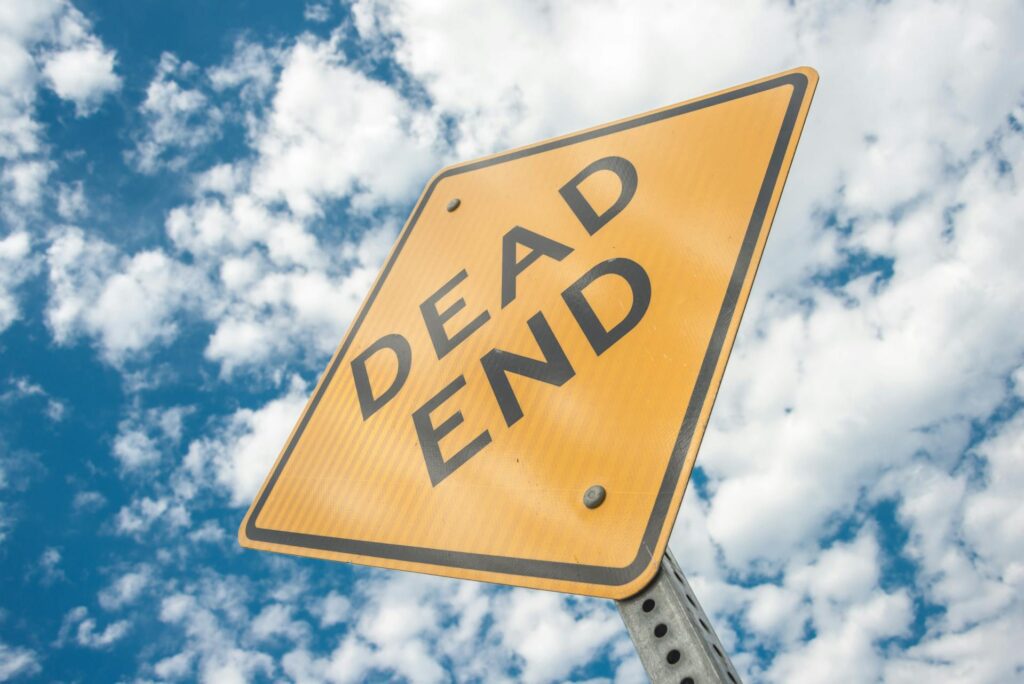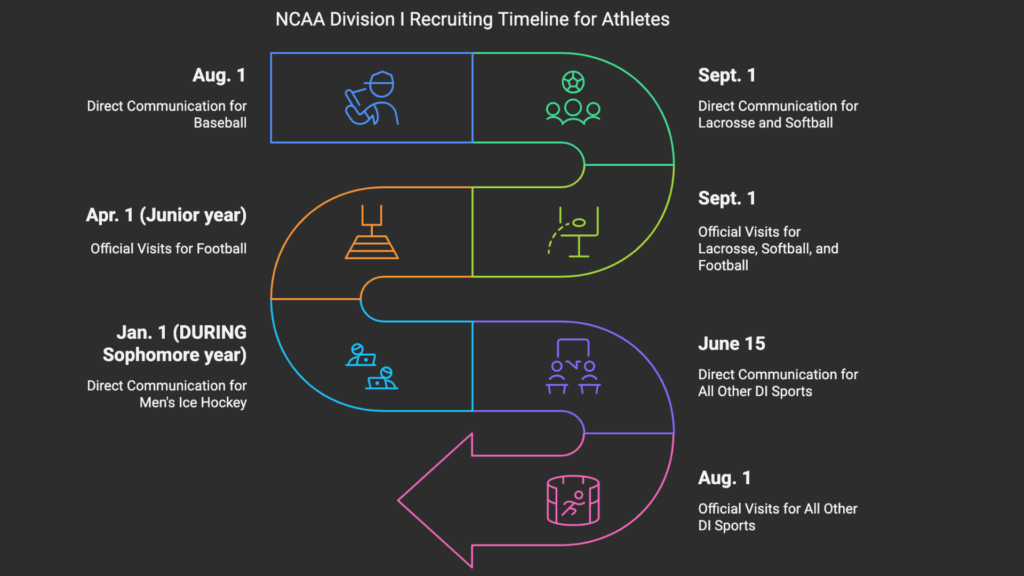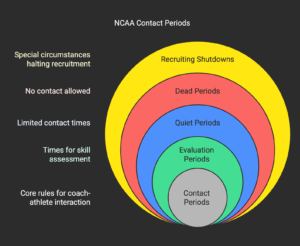NCAA Dead Period
- 11/11/2024
- College Recruiting, Sports Pyschology
- 6 mins read

As a high school athlete dreaming of competing at the collegiate level, understanding NCAA Dead Periods is crucial to your recruiting success. These rules dictate when and how college coaches can reach out to you, evaluate your skills, and invite you to campus.
This in depth guide will break down everything you need to know about NCAA dead periods in a way that’s easy to understand and apply to your recruiting journey.
NCAA Dead Period
When Can YOU Contact College Coaches?
The most important thing to understand about recruiting is this: while college coaches have strict limitations on when they can contact you, YOU face no such restrictions!
As a prospective student-athlete, you can contact college coaches at ANY TIME throughout your high school career. There are absolutely no rules limiting when you can email, call, or text coaches. This is your biggest advantage in the recruiting process!
If you reach out before coaches are permitted to have recruiting conversations with you, they’ll typically respond with:
- Links to recruiting questionnaires
- Information about upcoming camps or clinics
- General program information
While these responses might seem generic, they serve an important purpose—they allow coaches to maintain contact within NCAA Dead Period rules, while keeping track of interested prospects. The most successful recruits start reaching out early and consistently throughout high school.
When Can College Coaches Contact YOU?
When coaches can initiate contact varies dramatically based on your sport and the NCAA division. For most Division I sports, coaches can begin having recruiting conversations on either June 15 or September 1 after your sophomore year.
NCAA Dead Period
Division I Initial Contact Dates (After Sophomore Year)
Men’s and Women’s Lacrosse, Softball
Activity | When Permitted |
Direct Communication | Sept. 1 |
Unofficial Visits | Sept. 1 |
Official Visits | Sept. 1 |
Baseball
Activity | When Permitted |
Direct Communication | Aug. 1 |
Unofficial Visits | Sept. 1 |
Official Visits | Sept. 1 |
Football
Activity | When Permitted |
Direct Communication | Sept. 1 |
Unofficial Visits | Anytime |
Official Visits | Apr. 1 (Junior year) |
Men’s Ice Hockey
Activity | When Permitted |
Direct Communication | Jan. 1 (DURING Sophomore year) |
Unofficial Visits | Jan. 1 (DURING Sophomore year) |
Official Visits | Aug. 1 |
All Other DI Sports
Activity | When Permitted |
Direct Communication | June 15 |
Unofficial Visits | Aug. 1 |
Official Visits | Aug. 1 |

NCAA Dead Period
Division II & III Initial Contact Rules
Division II
NCAA Division II coaches can contact prospective student-athletes at any time through phone, text, email, or regular mail, without age restrictions. However, in-person communication cannot begin until June 15 after your sophomore year.
Division III
There are no rules restricting communication between prospective student-athletes and DIII coaches! Regardless of your grade, NCAA DIII coaches can have recruiting conversations with you at any point in the process.
Understanding the NCAA Recruiting Calendar
The NCAA recruiting calendar is more complex than just “contact periods.” It’s divided into several distinct phases that affect how and when coaches can interact with prospective athletes.
What is a Contact Period?
A contact period is when authorized athletics department staff can engage in virtually all forms of recruiting activities. During this time, coaches can:
- Have in-person, off-campus interactions with you and your parents
- Visit your school or home
- Watch you compete in person
- Call, text, and email you
- Host you for campus visits
Contact periods represent the most active recruiting windows and make up the majority of the calendar for most sports.
What is an Evaluation Period?
During an evaluation period, coaches can:
- Travel to watch you compete and evaluate your abilities
- Continue communication via phone, text, and email
However, they CANNOT:
- Have in-person recruiting conversations with you or your family
This creates an interesting dynamic where coaches might be sitting in the stands at your game but are prohibited from approaching you afterward to discuss their program.
What is a Quiet Period?
During a quiet period:
- Recruiting contacts are restricted to the college campus only
- Coaches cannot have face-to-face conversations with you off campus
- Coaches cannot evaluate you at competitions off campus
- You can visit campus and meet with coaches there
- Phone, email, and text communication continues normally
Many programs schedule prospect camps during quiet periods specifically to bring potential recruits to campus within NCAA guidelines.
What is a NCAA Dead Period?
During a NCAA dead period:
- In-person recruiting contacts are prohibited both on and off campus
- Coaches cannot watch you compete in person
- Official and unofficial campus visits are not permitted
- Communication via phone, text, and email is still allowed
NCAA Dead periods often occur around key events in the college sports calendar, such as championship tournaments, signing periods, or the start of academic terms.
What is a Recruiting Shutdown?
A recruiting shutdown means that absolutely no recruiting activity is permitted. This includes:
- No in-person contact
- No evaluations
- No electronic or telephone communication
Recruiting shutdowns don’t happen in every sport, but occur in women’s lacrosse, women’s basketball, swimming and diving, and baseball at certain times throughout the year.
NCAA Dead Period
NCAA Coach Contact Rules: Quick Reference
Activity | Contact Period | Evaluation Period | Quiet Period | Dead Period | Recruiting Shutdown |
In-person contact | YES | NO | Only on campus | NO | NO |
In-person evaluation | YES | YES | Only on campus | NO | NO |
Call/text/email | YES | YES | YES | YES | NO |
What Should YOU Be Doing During Different Periods?
Remember, these restrictions only apply to college coaches—not to you! Here’s how to maximize each period of the recruiting calendar:
During Contact Periods
- Attend showcases, tournaments, and camps where target coaches will be present
- Arrange campus visits to meet coaches face-to-face
- Follow up promptly after competitions or visits
- Ask specific questions about how you might fit into their program
During Evaluation Periods
- Research which coaches might attend your competitions
- Focus on consistent performance in games coaches are watching
- Follow up via email or phone after being evaluated
- Update coaches on improvements or accomplishments
During Quiet Periods
- Schedule campus visits and prospect camps
- Prepare thoughtful questions for campus visits
- Evaluate how comfortable you feel with the coaching staff and players
- Take detailed notes after visits to compare programs
During NCAA Dead Periods
- Update your highlight videos and recruiting profile
- Strengthen your academics
- Continue communication via phone, email, and social media
- Research programs more deeply to refine your target list
During Recruiting Shutdowns
- Focus on athletic development and skills training
- Improve your academic standing
- Create or update highlight videos
- Reassess your target list of schools
2025-2026 Key Recruiting Dates
Looking ahead to the 2025-2026 recruiting cycle, here are some critical dates to mark on your calendar:
Football (Division I FBS)
- April 15 – May 25, 2025: Spring contact period
- May 25-28, 2025: Dead period
- May 29 – June 22, 2025: Quiet period
- June 24 – July 31, 2025: Dead period
- August 1-31, 2025: Dead period (with exceptions)
- September 1 – December 1, 2025: Evaluation period
Baseball (Division I)
- March 1 – July 31, 2025: Contact period
- May 26 – June 2, 2025: Dead period
- June 21-23, 2025: Dead period
- July 3-5, 2025: Dead period
- August 1-18, 2025: Contact period
Basketball (Division I)
- April 15 – July 31, 2025: Contact period (with specific evaluation periods)
- July recruiting includes three evaluation periods and dead periods
- August 1-31, 2025: Quiet period (with exceptions)
- September 1-8, 2025: Dead period
NCAA Dead Period
Taking Control of Your Recruiting Journey
Understanding NCAA dead periods empowers you to take control of your recruiting process rather than waiting passively for coaches to find you. Here are the key takeaways from this guide:
- Be proactive! You can contact coaches at any time, regardless of NCAA Dead Period rules.
- Start early. The most successful recruits begin reaching out to coaches during freshman or sophomore year, well before coaches can respond with recruiting conversations.
- Know the timeline for your sport. Different sports have different contact dates—make sure you understand exactly when coaches in your sport can begin reaching out.
- Maximize each period. Each phase of the recruiting calendar offers unique opportunities if you approach it strategically.
- Keep detailed records. Track your communications with coaches, noting when you reached out, what their response was, and any specific follow-up needed.
Ready to take your recruiting journey to the next level? Make sure your athletic and academic profiles are up-to-date, your highlight videos showcase your best abilities, and you’ve researched programs that might be the right fit academically, athletically, and personally.
Remember: The athletes who find the best college fit are usually the ones who take control of their recruiting process early and maintain consistent communication with coaches throughout high school. You can’t control when coaches can contact you, but you can absolutely control when and how you reach out to them!
If you would like to start preparing a college recruiting strategy, click the button below….




